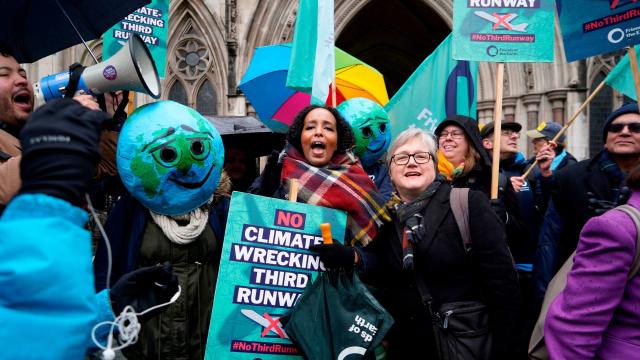On Wednesday, a British appeals court issued a ruling that Heathrow Airport’s long-planned third runway expansion in London is illegal due to its climate impacts that planners failed to adequately account for. The move is the latest in a decade-plus of wrangling over the expansion that would be a climate disaster.
The ruling”which could be appealed to the UK Supreme Court, or the government could go back and redraft its version of an environmental impact statement”shows we’re approaching a precipice of something bigger: The bottom is starting to fall out for fossil-fuel-friendly infrastructure.
There’s still a long way to go before fossil fuels are in free fall, but the warning sirens are starting to ring a little louder as courts, investors, and even companies themselves are coming to grips with the emerging world order.
The central question of this decade is this: How do we rapidly build a new world without carbon pollution? The answer is largely eschewing modes of development we came to rely on during the 20th century.
The Heathrow third-runway project is a prime example of that 20th-century mode of thinking. Already one of the world’s busiest airports, the third-runway project was pitched more than a decade ago as a way to expand capacity, allowing more flights to take off and land, and more passengers to scoot around the world using the most carbon-intensive form of transportation. That is, quite simply, incompatible with what needs to happen this decade. The world”and especially rich countries”need to undertake actions to cut their emissions.
The UK has committed to do that, including getting carbon emissions 40 per cent below 1990 levels by 2030 as part of the Paris Agreement and reaching net-zero emissions by 2050. (The country is currently not on track to meet those goals, which are also rated “insufficient” by the Climate Action Tracker, FWIW.) The groups that filed the case against Heathrow’s third runway argued that in light of the country’s commitments to the Paris Agreement, the expansion was untenable. The appeals court decision mostly agreed with them, noting plans for the airport put forward by the UK Department of Transportation “had not taken into account its own firm policy commitments on climate change under the Paris Agreement.” That the court invoked the international climate agreement is huge and could open the door for suits in other countries that have legal systems modelled on the UK to make the same arguments.
“For the first time, a court has confirmed that the Paris Agreement temperature has a binding effect,” Margaretha Wewerinke-Singh, a law expert at Leiden University, told the Guardian.
The agency could redraw its plan to show how the airport fits under its Paris Agreement emissions target, though it’s going to be tough to square it with the agreement’s commitments, particularly since the UK is set to host pivotal climate talks later this year. It would also fly in the face of the government’s world-first climate emergency declaration last year. The airport could appeal the decision to the Supreme Court, something it’ll likely do.
Regardless, the ruling is part of a growing series of signs that large forces are working against infrastructure that would expand the world’s use of fossil fuels. Just this week alone, Canadian fossil fuel developer firm Teck Resources Limited unexpectedly withdrew its proposal to build a massive tar sands min in Alberta and JPMorgan Chase”thee biggest fossil fuel lender in the world”announced a slew of reforms, including not funding any oil and gas exploration in the Arctic National Wildlife Refuge. They follow in the footsteps of Goldman Sachs late last year.
While American courts have so far let polluters and their enablers (including the U.S. government) off the hook, courts elsewhere haven’t. In addition to the UK ruling on Heathrow, the Netherlands Supreme Court ruled last year the country had to draw down its emissions 25 per cent below 1990 levels by the end of 2020 as part of a human rights case.
Have we reached the tipping point yet? Of course not. Carbon emissions are still higher than any point in human history, and the fossil fuel industry has expansion plans on its mind. There are also still in power hellbent on watching the world burn.
But we didn’t reach this inflection point with people standing idly by. Climate strikes, activists filing lawsuits, and indigenous leaders walking into board rooms to make their case have altered the course of the world, bending it toward a more just future. To completely tip the world into a new state, they’ll need reinforcements to keep the pressure on.
